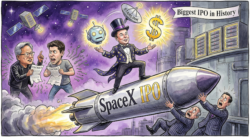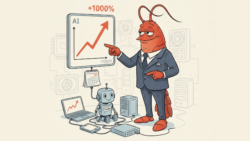In today’s issue:
- Musk skipped Trump’s big tariff reveal, raising questions about a political rift
- Trump’s policies may help Musk’s businesses, despite growing distance
- Musk is gearing up to launch a powerful new AI platform on 30 June
US President Donald Trump’s allies came out in full force on “Liberation Day” to support his announcement of sweeping new tariffs – but one key figure was missing.
Elon Musk, once a close ally and a two-time attendee of Trump’s Cabinet meetings, was nowhere to be seen.
While Trump stood in the Rose Garden unveiling a 10% blanket tariff on all imports – and up to 60% on others – Musk was busy engaging with followers on X, trading barbs with left-wing influencers and posting memes.
His absence didn’t go unnoticed.
Just last week, Musk had joined a high-level Cabinet meeting. And yet, as Trump delivered what could be a landmark speech on American trade policy – promising to end decades of the US getting “pillaged” and “ripped off” by foreign competitors – Musk was missing from the front row.
Why the sudden change?
Some political insiders suggest the absence was intentional. This was a sign that Musk may no longer be in Trump’s inner circle.
According to reporting from The Daily Beast, Trump aides were unhappy with Musk’s recent political dabbling, including his unsuccessful intervention in a Wisconsin Supreme Court election. Musk reportedly helped bankroll the campaign of a conservative candidate who went on to lose. A result that upset key figures in Trumpworld.
But the implications could stretch beyond personal politics.
Musk’s exclusion from the tariff reveal – a marquee policy moment in Trump’s campaign – may signal a cooling of ties just as the former president ramps up nationalist economic rhetoric.
Trump has proposed sweeping tariffs as part of his “America First” economic agenda, pledging to boost domestic manufacturing and reduce dependency on foreign technology.
Ironically, many of these policies could directly benefit Musk’s businesses. Tesla, SpaceX and Musk’s AI ventures all stand to gain from incentives for domestic production and investment in American tech infrastructure.
But according to my colleague James Altucher – a former hedge fund manager and long-time tech investor – Musk may see more opportunity outside the political sphere.
James believes Musk is preparing to step back from political theatre… and step fully into the spotlight with something even more ambitious.
He’s preparing to launch a platform he believes could disrupt not only the AI landscape, but the global economy.
In fact, Musk has already put a date on it: 30 June.
According to James, this new AI software system could be powerful enough to compete with – and possibly eclipse – current AI leaders like OpenAI and Google. And if it succeeds, it could unlock up to $29 trillion in new wealth.
That figure may sound eye-watering, but Musk’s track record of transforming industries makes it harder to ignore.
And James believes there’s a specific way UK investors can position themselves ahead of this launch – by looking at a small, overlooked supplier that could be key to making Musk’s vision a reality.
A monopoly in the making?
Now, of course, I know what you’re thinking: hasn’t the AI train already left the station? Haven’t we all missed the boat?
Well, yes and no.
The first wave of the AI boom sent shares of Nvidia soaring over 3,000% in the past five years. If you were lucky enough to be holding NVDA back in 2019, you’ve probably already upgraded your kitchen. And your house. And maybe your postcode.
But if you weren’t in early – don’t worry. Because what’s coming next could be even bigger.
According to James, Musk’s next move could unleash the second wave of the AI revolution.
And the key difference?
It’s not about chips. It’s about software.
James believes Musk is on the verge of rolling out the world’s first truly autonomous AI.
Not the kind that needs you to prompt it.
Not the kind that spits out generic blog posts when you ask it for a meal plan.
But an AI that can think, learn and act on its own.
And it’s already driving real-world Teslas, navigating streets without human input.
If that doesn’t sound like a game-changer to you, let me put it this way…
This is not just about self-driving cars.
As James puts it: this is about solving autonomy – the missing piece of the AI puzzle.
And if Musk succeeds, James believes it could give him a near-monopoly on the most powerful software ever created.
So where’s the investment angle?
Now, you might think the opportunity here is to buy Tesla stock.
But James has gone a step further.
He’s identified a much smaller company that he believes is absolutely critical to Musk’s AI platform – a supplier that provides a key piece of technology Musk’s AI can’t operate without.
He likens this company’s technology to the “prefrontal cortex” of the AI. It’s what allows the system to store data, process information and make decisions – without constant human input.
It’s already being used not just by Musk, but by Nvidia, too.
James believes this company could be perfectly positioned to benefit from Musk’s AI launch – currently targeted for 30 June.
And what makes this opportunity even more interesting?
The company is 26 times smaller than Nvidia, meaning any positive attention could have an outsized impact on its share price.
Of course, there are risks involved – as James is clear to point out. These include competition, regulatory uncertainty and broader tech market volatility.
But James also notes that some of the world’s most sophisticated investors – including BlackRock, Citadel and Bridgewater – have already taken significant positions in this stock.
In other words, the smart money may already be moving in.
From PayPal to Tesla to Neuralink – Musk has form
James also points to a pattern in Elon Musk’s career.
Time and again, Musk has launched ambitious technologies, filed key patents and gone on to build category-defining companies around them – often making early backers a lot of money in the process.
Think PayPal in digital payments. Tesla in EVs. SpaceX in space transport. Neuralink in brain-computer interfaces.
And now, James believes, we’re looking at the next chapter in that story.
This time, the focus is on AI – and specifically, building the first fully autonomous software platform that could eventually span cars, robots, mobile phones and more.
As James puts it: this isn’t about ChatGPT-style answers. It’s about problem-solving software that can operate independently, at scale.
And that’s a very different beast.
Here’s what to do now
Altucher has put everything you need to know – the name, ticker symbol, the full story – into a special new presentation titled: Elon Musk’s Monopoly: How to Profit from the Coming $29 Trillion Boom.
He walks you through the entire story, shows you how this AI actually works, and even gives a demo that’s… frankly, a little mind-blowing.
And yes – he’s making it available to UK investors too.
To see it for yourself, and discover the small company at the heart of Musk’s next trillion-dollar play, just click here.
Whatever your views on Musk… love him or hate him… one thing’s clear:
He knows how to build billion-dollar businesses.
And if Altucher is right, his next one could make today’s Tesla look like a warm-up act.
So click here to see Elon Musk’s AI in action – and get the full investment story.
Just make sure you do it before 30 June.
Because if history is anything to go by, this window won’t stay open for long.
Until next time,

James Allen
Contributing Editor, Investor’s Daily
Past performance and forecasts are not reliable indicators of future results. 5 year performance data for Nvidia: 2020: 122.3% | 2021: 83.1% | 2022: 125.3% | 2023: 92.4% | 2024: 110.2%”




